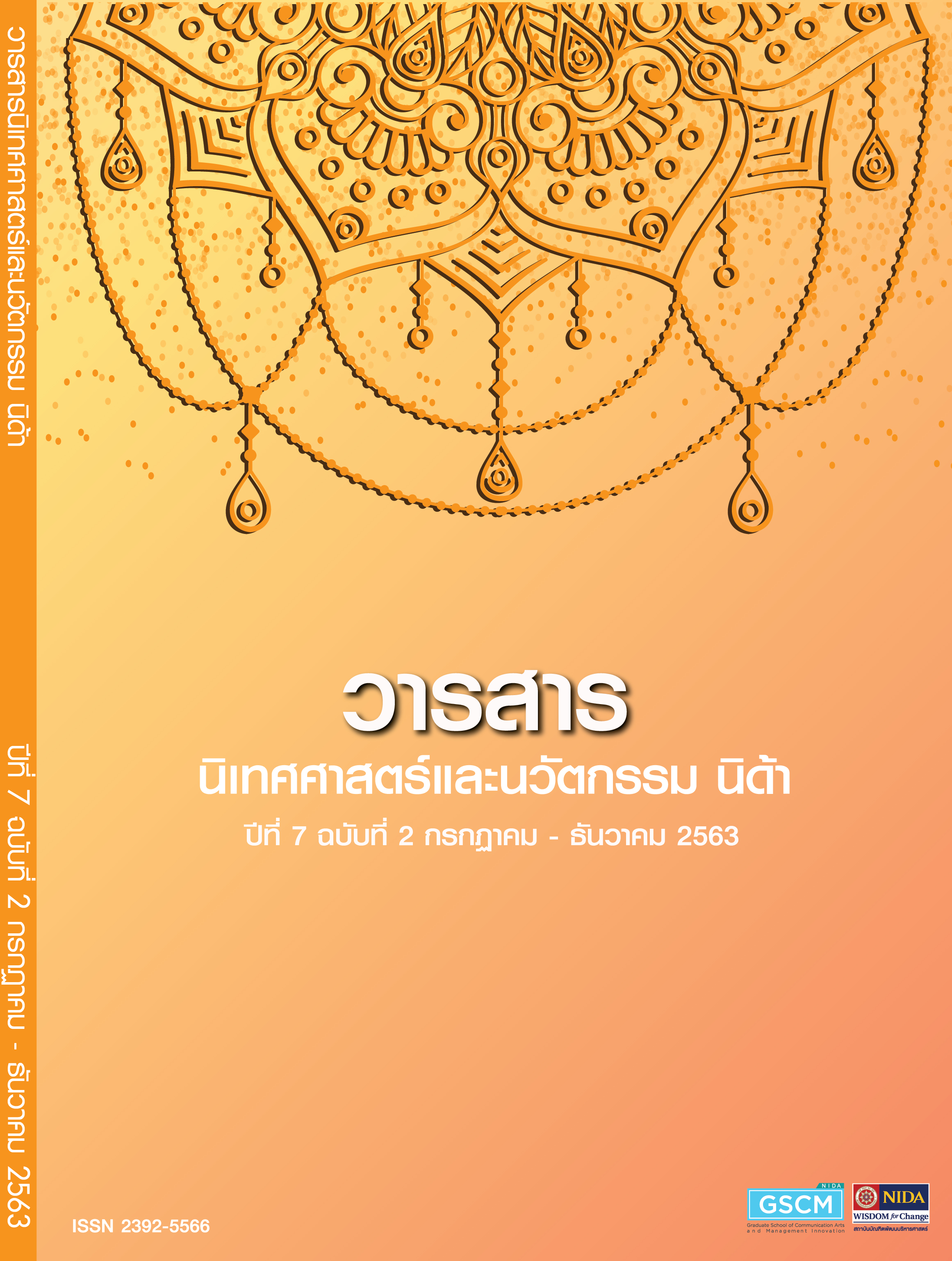Behavioral change of plastic straw reducing in coffee shops through Community-based Social Marketing
Main Article Content
Abstract
The objective of this research is to study plastic straw reducing in coffee shops through Community-based Social Marketing. As qualitative research, information used in this study was collected in-depth interview and participant observation in two prototype coffee shops: Library cafe and Yelo cafe. Both prototype shops provide alternatives including PLA bio-plastic straws and Paper straws as a possible way of a coffee shop’s policy.
The study adopted 2 behavioral change strategies: 1) Serving drinks with no straws but providing straws at a coffee station. 2) Serving drinks with no straws and straws are strictly given upon request. In addition, Community-based Social Marketing Tools such as Norm, Prompt, Message and Communication were used for eliminating barriers and maintaining new behaviors.
In conclusion, the findings of this study suggest that to choose strategies suitability of the coffee shop features that depending on location, service, types of coffee shop and brand image. Moreover, the supportive behaviors of customers have influenced staffs’ behaviors to changing coffee shop culture and positively impacted adoption of plastic straw reducing policy in the coffee shops.
Article Details
ข้อความและความเห็นในวารสารนิเทศศาสตร์และนวัตกรรม นิด้า เป็นของผู้เขียนแต่ละท่าน มิใช่ของคณะนิเทศศาสตร์และนวัตกรรมการจัดการ สถาบันบัณฑิตพัฒนบริหารศาสตร์
References
โกศล สถิตธรรมจิตร. (2562). เราเลิกกันเถอะ ความตื่นตัวเรื่องการรณรงค์เลิกใช้ Single-use Plastic ของทั้งเทศและไทย แรงขับเคลื่อนที่เป็นความหวังของอนาคต. สืบค้นจากhttps://readthecloud.co/california-single-use-plastic-legislation/
ฉัตยาพร เสมอใจ. (2550). พฤติกรรมผู้บริโภค. กรุงเทพฯ: บริษัท ซีเอ็ดยูเคชั่น จำกัด.
เดลินิวส์. (2561). เมืองซีแอตเทิลห้ามร้านอาหารใช้หลอด-ภาชนะพลาสติก. สืบค้นจาก https://www.dailynews.co.th/foreign/652913
ทวีศักดิ์ บุตรตัน. (2562). บทวิเคราะห์ : โลก “แบน” พลาสติกยังไง. มติชน. สืบค้นจาก https://www.matichonweekly.com/column/article_191720
นรินทร บุญอำพล. (2556). การตั้งราคาของธุรกิจขนาดย่อยต่อแนวทางการประกอบธุรกิจร้านกาแฟสด. (วิทยานิพนธ์ปริญญามหาบัณฑิต). มหาวิทยาลัยศิลปากร, กรุงเทพฯ.
นิรมล สุธรรมกิจ. (2559). จับกระแสเศรษฐกิจสีเขียว. [จุลสาร]. กรุงเทพฯ: ศูนย์วิจัยนโยบายด้านเศรษฐกิจสีเขียว มหาวิทยาลัยธรรมศาสตร์.
บุญฤทธิ์ กิตติถิระพงษ์. (2553). การประยุกต์ใช้ทฤษฎีการตลาดเพื่อสังคมในการขับเคลื่อนความ เข้มแข็งเชิงสุขภาพของชุมชน. (วิทยานิพนธ์ปริญญาดุษฎีมหาบัณฑิต). จุฬาลงกรณ์มหาวิทยาลัย, กรุงเทพฯ.
ปราณธีร์ รังแก้ว. (2555). กระบวนการนำเครื่องบดย่อยขยะเอนกประสงค์ไปใช้ในเขตอำเภอสารภี จังหวัดเชียงใหม่. (วิทยานิพนธ์ปริญญามหาบัณฑิต). มหาวิทยาลัยเชียงใหม่, เชียงใหม่.
ปารมี พัฒนดุล. (2559). ปัจจัยที่มีผลต่อการตั้งใจซื้อผลิตภัณฑ์เพื่อสิ่งแวดล้อมของผู้บริโภค อำเภอปากเกร็ด จังหวัดนนทบุรี. วารสารมหาวิทยาลัยศิลปากร, 9(2).
พรทิพย์ ใจมั่น (2560). หลอดพลาสติก ขยะชิ้นเล็กที่สังคมไม่ควรมองข้าม. สืบค้นจาก http://www.moveworldtogether.com/TH/article-detail.php?ID=22
พรรณรังสี อินทร์พยุง. (2559). พฤติกรรมการบริโภคผลิตภัณฑ์สีเขียวของเยาวชนในเขตดุสิต กรุงเทพมหานคร. สืบค้นจาก http://www.eresearch.ssru.ac.th/xmlui/handle/123456789/818?show=full
พฤภัทร ทรงเที่ยง. (2561). รับหลอดไหมคะ. เดอะสแตนดาร์ด. สืบค้นจากhttps://thestandard.co/no-plastic-straw/
ศิริวรรณ เสรีรัตน์. (2539). องค์การและการจัดการ. กรุงเทพฯ: สำนักพิมพ์วิสิทธิ์พัฒนา.
ศูนย์วิจัยกสิกรไทย. (2561). ธุรกิจร้านกาแฟ บริหารอย่างไรให้รุ่ง. สืบค้นจาก https://kasikornbank.com/th/business/sme/KSMEKnowledge/article/KSMEAnalysis/Documents/Coffee-Shop-Management.pdf
สุดารัตน์ กันตะบุตร. (2554). ปัจจัยที่มีความสัมพันธ์ต่อการตัดสินใจซื้อสินค้าเพื่อสิ่งแวดล้อมของผู้บริโภคในจังหวัดนครราชสีมา. สารนิพนธ์บริหารธุรกิจมหาบัณฑิต, มหาวิทยาลัยเทคโนโลยีราชมงคลธัญบุรี.
Brand Buffet. (2561). สุขภาพ + สิ่งแวดล้อม เร่งดีมานด์แพคเกจจิ้งทางเลือก พร้อมทางรอดบรรจุภัณฑ์พลาสติกต้องปรับตัวอย่างไร. สืบค้นจาก https://www.brandbuffet.in.th/2018/08/fest-innovation-packaging/?utm_source=LINE&utm_medium=Content+Discovery&utm_campaign=LINE+TODAY
TCIJ. (2561). ภายใต้กระแส “รักษ์โลก” การใช้พลาสติกในไทย (แค่) เติบโตช้าลง. สืบค้นจาก https://www.tcijthai.com/news/2018/07/scoop/8385
The Momentum. (2562). อียูผ่านกฎหมายแบนพลาสติกแบบใช้ครั้งเดียวทิ้ง. สืบค้นจาก https://today.line.me/th/pc/article/อียูผ่านกฎหมาย+แบนพลาสติกแบบใช้ครั้งเดียวทิ้ง-KYp18k
Al Jazeera and news agencies. (2019). EU parliament approves ban on single-use plastics. Retrieved from https://www.aljazeera.com/news/2019/03/eu-parliament-approves-ban-single-plastics-190327182018338.html
Freemen, J.B. (1988). Thinking Logically Basic Concepts for Reasoning. Englewood Cliffs, New Jersey: Prentice Hall.
Lightman, D. (2011). Community-based social marketing at the neighborhood scale: sustainable behavior or neighborhood sustainability?. Retrieved from http://hdl.handle.net/1721.1/67228
Mckenzie-Mohr, D., & Schultz, P. W. (2014). Choosing effective behavior change tools. Social Marketing Quarterly, 20(1), 35-46. doi:10.1177/1524500413519257
Moore, G. A. (1995). Crossing the chasm: Marketing and selling high–tech products to mainstream customers. New York: Harper Business.
Ocean Conservancy. (2016). Top 10 items collected. Retrieved from https://oceanconservancy.org/wp-content/uploads/2017/06/International-Coastal-Cleanup_2017-Report.pdf
Peattie, K. (2001). Towards Sustainability: The Third Age of Green Marketing. The Marketing Review, 2: 129-146.
Philip Kotler. (2003). Marketing Management. Upper Saddle River, New Jersey: Prentice Hall
Roger, E.M. (2003). Diffusion of innovations. (5th ed.). New York: Free.
Siripan Krasaesan. (2016). UNIVERSAL DESIGN FOR BUILDING AN INCLUSIVE SOCIETY IN THAILAND: COMMUNITY-BASED SOCIAL MARKETING. (Doctoral dissertation). National Institute of Development Administration, Bangkok.
Solomon, M.R. (2015). Consumer Behaviour: Buying, having and being (11th ed.). Edinburgh Gate, England: Pearson Education.


